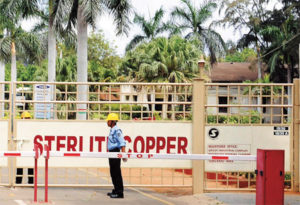
by N.S. Venkataraman 28/5/2018
Protest against Sterlite copper project in Tamil Nadu, India which resulted in violence and the subsequent decision to close down the unit by the state government has been widely reported all over the world and has caused concern amongst the investors.
In recent times, some industrial projects, nuclear power plants, and infrastructure schemes have been blocked in India due to public protests and demonstrations, due to one reason or the other. While as per the regulations, a public hearing must be conducted before providing approval for such projects, most of such public hearings are attended by one or two hundred people, who cannot be considered as the representative gathering.
Such problem of projects being blocked have become too frequent in Tamil Nadu, with almost every project now being objected to by those who claim themselves to be environmental activists or fringe groups.
Neutrino project in Tamil Nadu which is an advanced research project of great futuristic importance and which was strongly recommended by Dr. A.P.J.Abdul Kalam, a much-respected scientist and former President of India, is now facing uncertainty, as a group of people has organized the protest. So many other projects like natural gas pipeline project from Kerala to Tamil Nadu, gas exploration project at Neduvasal, a port project at Colachal in Kanyakumari district have all come to a standstill due to protests and demonstrations.
The copper project of Sterlite industry in Tuticorin has now stopped operations due to sustained public protest and demonstration by a group of people, which finally resulted in violence and unfortunate death of some innocent people, who happened to be part of the violent demonstration.
In the case of Sterlite, the Vedanta group which is running the project has repeatedly claimed that they have not violated any regulations. Around 3000 persons are working in the factory premises. Some employees in the company are living in the housing quarters very near the factory premises, and several thousands of people are indirectly employed for carrying out various activities. Behind each one of the employee/worker, there should be a family of at least three to four persons. None of these persons have complained about any uneasiness or problems due to the operations of Sterlite copper project.
The employees took out a procession and gave representation to the government that the Sterlite factory should not be closed. Apparently, in taking the final decision by the government to close the unit, the views of the employees, who are as many residents of Tuticorin as anybody else, have not been given any importance and they have not even been called for any discussions by the Tamil Nadu Pollution Control Board or the officials in the government.
It is also a fact that there have been sustained campaign against the project and number of persons living in and around Tuticorin region want the factory to be closed.
While the government of Tamil Nadu has decided to close the unit, it is necessary to recognize that there are divergent views on the matter with both appreciation and criticism for the decision taken by the government.
In such circumstances, the ideal method to decide the fate of any industrial infrastructure project is to ascertain the views of the public in an organized, systematic and complete way, where everyone will have the opportunity to state the opinions so that the final decision can be taken in a fair manner.
It needs to be kept in view that in a place like Tuticorin with a population of several lakhs, while a few thousand people came out and demonstrated in public, there are lakhs of people who have not participated in this exercise. What is the view of the people who have not joined? Should such vital decisions close down the unit with thousands of crore of rupees be taken by some protestors creating a law and order situation?
There are instances in the world where fair decisions have been taken by the referendum democratically on various issues. For example, the decision not to join Brexit was adopted by England by a referendum. The recent decision in Ireland to permit a referendum has also taken abortion.
Is not a referendum to ascertain the views of the people before taking decisions In the case of industrial and infrastructure projects, facing objections from some quarters, a fair, dignified, civilized and only way of arriving at a resolution that none can dispute?
